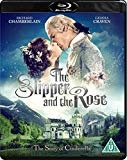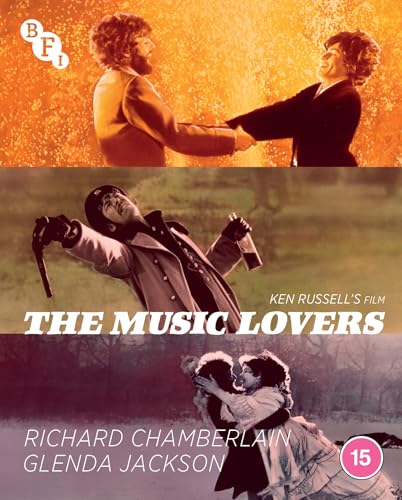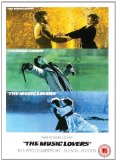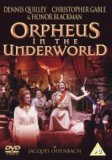 The Slipper And The Rose (Blu-Ray) | Blu Ray | (20/11/2017)
from £15.99
| Saving you £N/A (N/A%)
| RRP
The Slipper And The Rose (Blu-Ray) | Blu Ray | (20/11/2017)
from £15.99
| Saving you £N/A (N/A%)
| RRP You know the story: Cinderella rides in a magical pumpkin to the ball, enchants the prince and flees at midnight. He finds her slipper and tracks her down, and they live happily ever after. But wait! In The Slipper and the Rose, it turns out there's more to the life of a prince than being charming. The king prefers to choose the prince's wife, one of proper social station who would provide a strong political alliance to ward off the kingdom's enemies. That's one of the twists in this 1976 British take on the classic fairy tale, one of a long line of musical versions. The disgruntled prince, who's as much of a focal point here as the lady with the footwear, is played by Richard Chamberlain, during the years when he was taking on the classics and had not yet been crowned king of the TV mini-series. He displays a pleasant voice opposite Gemma Craven as Cinderella, and veteran character actor Michael Hordern as the king leads the supporting ensemble. Add lavish sets and lush scenery (partially filmed in Austria), humour, fun choreography, and an Oscar-nominated score full of charming songs by Richard M. and Robert B. Sherman (veterans of such Disney movies as Mary Poppins and The Jungle Book, and who also co-wrote the script with director Bryan Forbes), and you have a grand, engaging family musical. The 143-minute running time and dreamy, deliberate pace might test the patience of antsy viewers, but The Slipper and the Rose's legion of fans wouldn't have it any other way. --David Horiuchi, Amazon.com
 The Music Lovers (Blu-ray) | Blu Ray | (24/06/2024)
from £18.75
| Saving you £N/A (N/A%)
| RRP
The Music Lovers (Blu-ray) | Blu Ray | (24/06/2024)
from £18.75
| Saving you £N/A (N/A%)
| RRP Guided throughout by the swells and dips of Tchaikovsky's music, Ken Russell's The Music Lovers examines the tragedies of Tchaikovsky's life through opulent and fantastic musical sequences running alongside a narrative of the composer's life between 1875 and 1881. Touching on his disastrous marriage with Antonia Miliukova, his relationship with his patroness Nadezhda von Neck, and his repressed homosexuality, The Music Lovers is anchored by magnetic central performances from Glenda Jackson following her Academy Award for Women in Love, coupled with Richard Chamberlain as a neurotic Tchaikovsky. Forming part of Ken Russell's collection of experimental composer biopics, The Music Lovers features plenty of his signature provocation and excess, but ultimately takes a sympathetic lens to Tchaikovsky's life in a repressive Russian society.
![Women In Love [1969]](/pictures/1005417.jpg) Women In Love | DVD | (02/08/2004)
from £22.97
| Saving you £-9.98 (N/A%)
| RRP
Women In Love | DVD | (02/08/2004)
from £22.97
| Saving you £-9.98 (N/A%)
| RRP Before director Ken Russell's name became synonymous with cinematic extravagance and overkill, he actually directed what is one of the most passionate and involving adaptations of DH Lawrence in recent memory. Oliver Reed and Alan Bates star as friends who fall in love with a pair of sisters (Jennie Linden and Glenda Jackson, who won an Oscar for the role). But the relationships take markedly different directions, as Russell explores the nature of commitment and love. Bates and Linden learn to give themselves to each other; the more withdrawn Reed cannot, finally, connect with the demanding and challenging Jackson. Shot with great sensuality, Women in Love was surprisingly frank for its period (1970) and includes one of the most charged scenes in movie history: Bates and Reed as manly men, wrestling nude by firelight. --Marshall Fine
![The Slipper And The Rose [1976]](/pictures/1011696.jpg) The Slipper And The Rose | DVD | (16/08/2004)
from £14.24
| Saving you £-8.25 (N/A%)
| RRP
The Slipper And The Rose | DVD | (16/08/2004)
from £14.24
| Saving you £-8.25 (N/A%)
| RRP You know the story: Cinderella rides in a magical pumpkin to the ball, enchants the prince and flees at midnight. He finds her slipper and tracks her down, and they live happily ever after. But wait! In The Slipper and the Rose, it turns out there's more to the life of a prince than being charming. The king prefers to choose the prince's wife, one of proper social station who would provide a strong political alliance to ward off the kingdom's enemies. That's one of the twists in this 1976 British take on the classic fairy tale, one of a long line of musical versions. The disgruntled prince, who's as much of a focal point here as the lady with the footwear, is played by Richard Chamberlain, during the years when he was taking on the classics and had not yet been crowned king of the TV mini-series. He displays a pleasant voice opposite Gemma Craven as Cinderella, and veteran character actor Michael Hordern as the king leads the supporting ensemble. Add lavish sets and lush scenery (partially filmed in Austria), humour, fun choreography, and an Oscar-nominated score full of charming songs by Richard M. and Robert B. Sherman (veterans of such Disney movies as Mary Poppins and The Jungle Book, and who also co-wrote the script with director Bryan Forbes), and you have a grand, engaging family musical. The 143-minute running time and dreamy, deliberate pace might test the patience of antsy viewers, but The Slipper and the Rose's legion of fans wouldn't have it any other way. --David Horiuchi, Amazon.com
![A Simple Man [1987]](/pictures/1027973.jpg) A Simple Man | DVD | (18/02/2005)
from £23.05
| Saving you £-3.06 (N/A%)
| RRP
A Simple Man | DVD | (18/02/2005)
from £23.05
| Saving you £-3.06 (N/A%)
| RRP Commissioned to celebrate the centenary of the birth of the painter L.S. Lowry in 1987 this BAFTA award-winning dramatic ballet celebrates the life and work of a unique artist. Created by Gillian Lynne in collaboration with the composer Carl Davis this memorable production filmed in 1987 is performed by the Northern Ballet Theatre led by ex-Royal Ballet stars Christopher Gable and Moira Shearer. Re-mastered for DVD with the addition of recent interviews with Lynne and Davis it gives a fascinating insight into the creation of an inspirational work in the history of dance which remains as fresh as ever.
![The Rainbow [1989]](/pictures/1048782.jpg) The Rainbow | DVD | (24/09/2007)
from £7.55
| Saving you £8.44 (111.79%)
| RRP
The Rainbow | DVD | (24/09/2007)
from £7.55
| Saving you £8.44 (111.79%)
| RRP Defying the moral constraints of Victorian England and her parents a young woman engages in unbridled promiscuity with two partners before setting out to capture the full sensuality of life itself. Based on the novel by D.H. Lawrence.
![Delius - Song Of Summer [1968]](/pictures/1006239.jpg) Delius - Song Of Summer | DVD | (10/04/2003)
from £N/A
| Saving you £N/A (N/A%)
| RRP
Delius - Song Of Summer | DVD | (10/04/2003)
from £N/A
| Saving you £N/A (N/A%)
| RRP Perhaps the finest of the series of biographical films that Ken Russell made for the BBC in the sixties 'Song of Summer' is an immensely moving story of sacrifice idealism and musical genius. Based on Eric Fenby's 1936 memoir 'Delius As I Knew Him' it traces the last years of Frederick Delius and Fenby's dedication in giving up five years of his life to helping the blind paralysed composer set down the unfinished scores he could hear in his head. There are terrific performa
![Mahler [1974]](/pictures/1017174.jpg) Mahler | DVD | (28/03/2005)
from £96.57
| Saving you £-83.58 (N/A%)
| RRP
Mahler | DVD | (28/03/2005)
from £96.57
| Saving you £-83.58 (N/A%)
| RRP Available for the first time on DVD. Ken Russell's unusual film biography of the Austrian composer whose unique compositional style altered the evolutionary course of western music. Jealousy over his attractive wife the insanity of a fellow music student his conversion from the Jewish to the Catholic faith the tragic death of his young daughter his own ill health - these are just some of the elements chosen for this symbolic visualisation of Mahler and his music. The flow of t
 The Music Lovers 1970 DVD | DVD | (27/06/2011)
from £N/A
| Saving you £N/A (N/A%)
| RRP
The Music Lovers 1970 DVD | DVD | (27/06/2011)
from £N/A
| Saving you £N/A (N/A%)
| RRP Composer Peter Tchaikovsky (Richard Chamberlain) abandons his intimate friend , Count Chiluvsky (Christopher Gable), when Madame Von Meck (Izabella Telezynsky) sponsors him after hearing him perform his First Piano Concerto.A tortured man , unhappy except in his music, Tchaikovsky marries Nina Milukova (Glenda Jackson), a passionate, neurotic woman. When he is unable to fulfill the demands of matrimony, his tensions become so great that he attempts suicide and has a nervous breakdown. Nina’s world also falls apart and she deteriorates into madness and is commited to an asylum.Tchaikovsky recuperates at a country mansion of Madame Von Meck. The two correspond but never meet. At a great party which she holds in his honour, Count Chiluvsky appears, and when Tchaikovsky rebuffs him he tells Madame Von Meck the truth about her protg. She immediately severs all connections with the composer.Tchaikovsky is hurt but continues to compose and conduct throughout the world. World fame does nothing to ameliorate his unhappy state. At the age of 53, after composing his “requiem” his Pathetique Symphony, he deliberately drinks water contaminated with cholera germs.A few days later he is dead. Decades later his music still lives!
 Orpheus In The Underworld | DVD | (21/02/2005)
from £N/A
| Saving you £N/A (N/A%)
| RRP
Orpheus In The Underworld | DVD | (21/02/2005)
from £N/A
| Saving you £N/A (N/A%)
| RRP Eurydice is married to Orpheus but has started an affair with a local shepherd called Aristaeus. However Aristaeus is really Pluto in disguise and he becomes so besotted with Eurydice that he lures her to a field where she is bitten by a snake. He then reveals his true identity and whisks her away to Hades so they can be together. Orpheus now a free man is happy about this new situation until his mother insists he rescues Eurydice from Hades. Meanwhile King Of The Gods Jupiter ha
![The Rainbow [1989]](/pictures/1006267.jpg) The Rainbow | DVD | (23/07/2001)
from £N/A
| Saving you £N/A (N/A%)
| RRP
The Rainbow | DVD | (23/07/2001)
from £N/A
| Saving you £N/A (N/A%)
| RRP A respectable and picturesque realisation of DH Lawrence's novel, 1989's The Rainbow is director Ken Russell's prequel to his 1969 version of Women in Love. By Russell's standards, this is a remarkably restrained treatment of Lawrence's novel, set in the Midlands in the 19th century: with its lush, rural setting and quaint bucolic soundtrack there are moments when you might imagine you're watching The Railway Children--until the sex scenes kick in, that is. Her soul infused with infinite longing by the sight of a rainbow as a child, Ursula Brangwen grows up restless at the prescribed roles set out for women in Victorian England, which are stoically endured by her mother (Glenda Jackson, who played Ursula's sister Gudrun in Women in Love). She idealises her swimming instructor--the older, more experienced Winifred (Amanda Donohoe) with whom she enjoys a passionate, borderline lesbian relationship. She becomes a schoolteacher against her parents' wishes, and takes up with Paul McGann, who is somewhat tepid as a Boer War officer. Ultimately, however, she finds all of these limitations too constraining and finally strikes out on her own in search of true spiritual and sexual freedom. On the DVD: This is a full-screen version of the film, ratio 4:3. The sound quality is fine as is the colour and sharpness, though like the film itself, not quite as ravishing as you might hope. Special features consist of a routine trailer ("She played by her passion, not by their rules") and disappointingly perfunctory "filmographies" of the director and cast: merely lists of their previous movies. --David Stubbs

Please wait. Loading...
This site uses cookies.
More details in our privacy policy